Journal
Mark A. Smith, The Power of God

Title
Mark A. Smith, The Power of God
Publication Type
Journal Article
Year of Publication
1999
Authors
Freeman, Robert C. (Primary)
Journal
FARMS Review
Pagination
88-89
Volume
11
Issue
1
Abstract
Review of The Power of God (1997), by Mark A. Smith.
The Power of God
|
In his book The Power of God, author and attorney Mark Smith provides a mixture of insights, formulas, and definitions on the subject of faith’s power. This text could also have been entitled Faith as Smith asserts that the phrase power of God is a synonym for the term faith. Although I am slow to conclude that faith is the only meaning of the phrase power of God, the book is instructional and generally makes a contribution to the study of this important topic.
At times, the text lacks a thoroughness of discussion and quotes little from very recent general leadership of the church. A fair amount of credit for the doctrinal aspects of this book belongs to Elder Bruce R. McConkie, who is quoted extensively (no less than thirty times, far more than any other source). While portions of this text are clearly the result of years of thinking and writing, as in the case of the chart that accompanies the author’s discussion of “The Three ‘Faces’ of Faith” (see pp. 62–63), other sections of the book appear to be little more than a compilation of quotations (see pp. 182–90). Additionally, the author is occasionally guilty of employing more scriptural text than his point requires. For example, more than three pages of scriptural text—Doctrine and Covenants 46:10–33; Moroni 10:8–21; and 1 Corinthians 12:4–13—are quoted at pages 87–90, simply to enumerate a dozen or so key spiritual gifts; perhaps a simple crossreference would have sufficed. The author occasionally reiterates points in a redundant fashion (see, e.g., p. 80).
Conversely, the author is guilty in some cases of hanging his doctrinal position on a single quotation and in other places of placing too heavy a reliance on less-known sources without contemporary quotations to give balance to the discussion. At times, specific assertions of the author invite further examination. For instance, Smith declares that “belief is not the power of God” (p. 37). But this conclusion is not well supported by the author. Because this is an important idea, perhaps more effort should have been expended to offer the reader more evidence of what and how the notion of belief lacks in relation to faith. Further, the author may have fallen short in presenting a convincing case that belief can be misdirected while faith cannot (see p. 40).
The author employs concepts from the world of business and law to assist the reader in evaluating particular principles. Terms such as causation, prima facie, trustee, shareholders, and corporation are used to explain more intricate points of doctrine. While the use of such terms is generally helpful, on occasion Smith is perhaps too creative in his discussion. This text has a tendency to overgeneralize. For example, the author suggests, “Christ on multiple occasions commented about how little faith we mortals have” (p. 85). While Jesus may have done so in the New Testament context, he had a very different view, it seems, of those he taught in the New World setting (see 3 Nephi 19:28, 35).
Again, this text has a contribution to make. Much of the discussion on the subjects of faith and power is enlightening. Especially insightful is Smith’s discussion of the principle of agency (pp. 73–74)—he argues in favor of using the general term agency rather than the phrase free agency, citing the fact that the latter is not specifically found in the scriptural canon. Near the end of the book, though, the author asserts, “We need the type of knowledge which this book seeks to provide” (p. 90). Although arguably true, the determination of which nuggets of knowledge come from this offering may be best left up to the reader.
Subject Keywords
Bibliographic Citation
Terms of use
Items in the BMC Archive are made publicly available for non-commercial, private use. Inclusion within the BMC Archive does not imply endorsement. Items do not represent the official views of The Church of Jesus Christ of Latter-day Saints or of Book of Mormon Central.